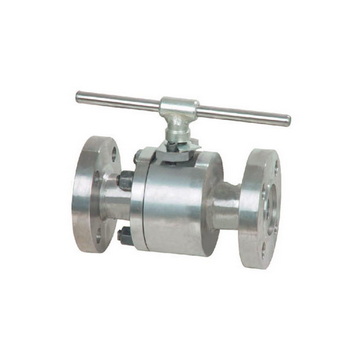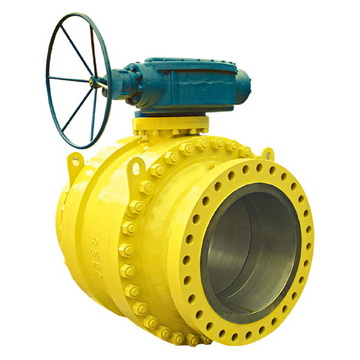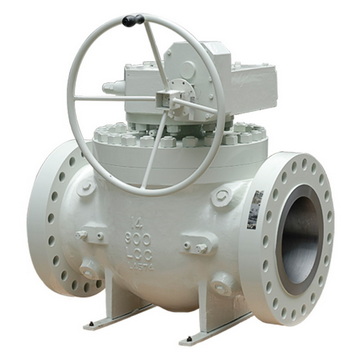Top Flanged Ball Valve Manufacturers and Suppliers in UK
Content Menu
● Understanding Flanged Ball Valves
>> Construction and Design Features
>> Advantages of Flanged Ball Valves
● Prominent Flanged Ball Valve Manufacturers and Suppliers in the UK
>> EuroValve (Eurovalve UK Limited)
>> Actuation Valve (Kingdom Controls)
● Applications of Flanged Ball Valves Across UK Industries
● Advanced Technologies and Trends in Flanged Ball Valves
● FAQ
>> 1. What are the advantages of flanged ball valves over other valve types?
>> 2. What materials are commonly used in flanged ball valves?
>> 3. Can flanged ball valves be automated?
>> 4. What pressure ratings do flanged ball valves support?
>> 5. How do I select the right flanged ball valve for my application?
Flanged ball valves are critical components in a variety of industrial applications, especially in sectors such as oil and gas, water treatment, chemical processing, and manufacturing. In the UK, numerous Flanged Ball Valve manufacturers and suppliers provide high-quality flanged ball valves designed to meet rigorous performance standards. This article explores the key players in the UK flanged ball valve market, highlights product features, applications, and technologies, and offers a deep dive into their construction, advantages, and usage. By understanding these aspects, engineers, purchasers, and end-users can make informed decisions when selecting flanged ball valves for their operations.

Understanding Flanged Ball Valves
Flanged ball valves are a type of quarter-turn valve that uses a hollow, perforated, and pivoting ball to control the flow of liquids or gases through a pipeline. Unlike other valve types, the flanged design allows the valve body to be securely bolted between piping sections with standardized flange patterns such as ANSI, DIN, or EN. This ensures a reliable, leak-proof connection which simplifies installation and maintenance across different industrial pipelines.
Their construction allows either full bore or reduced bore configurations. Full bore valves offer minimal flow resistance, which is critical in systems where pressure drop must be minimized. Reduced bore valves are more economical and can be suitable in applications where slight flow restriction is acceptable. Flanged ball valves are valued for their ease of operation, typically requiring only a quarter turn (90 degrees) to fully open or close, which enables rapid isolation or flow control.
Construction and Design Features
Flanged ball valves typically have a robust metallic body made from a wide range of materials including stainless steel, carbon steel, or alloys, selected based on the application's corrosive and temperature requirements. The valve consists of several key elements:
- Body and End Connections: The body houses the ball and seats, while the flanged ends allow for bolted connection to pipes. Flange dimensions adhere to industry standards to ensure compatibility.
- Ball: A precision-machined ball with a hollow center that rotates to open or close flow. It may be chrome plated or coated to resist wear and corrosion.
- Seats: Soft seats made from PTFE, reinforced PTFE, or other polymers provide tight sealing. Metal seats are employed in high-temperature or abrasive applications for durability.
- Stem and Seals: The stem connects the ball to the actuator or handle and includes packing or seals to prevent leakage along the stem.
- Actuator Interface: Designed to accommodate manual handles, gear boxes, pneumatic or electric actuators.
Advantages of Flanged Ball Valves
- Leak-tight Sealing: Effective seat and seal design ensure minimal leakage even in high pressure or aggressive media.
- Durability: Strong construction materials and designs that withstand temperature extremes and mechanical stresses.
- Ease of Maintenance: The flanged connection and modular designs facilitate easy disassembly and servicing without removing the entire valve from the pipeline.
- Versatility: Suitable for a wide range of fluids including water, steam, oil, gas, and corrosive chemicals.
- Automation Ready: Can be fitted with actuators for remote control and integration into automated process systems.
- Safety: Lockable handles and fail-safe actuator options enhance operational safety.
Prominent Flanged Ball Valve Manufacturers and Suppliers in the UK
The UK hosts a variety of established manufacturers and suppliers offering an extensive range of flanged ball valves with customizable specifications.
ESI Technologies Group
ESI Technologies Group is a leader in distributing flanged ball valves in the UK and Ireland, sourcing high-performance valves from reputable manufacturers like ITT Habonim. Their valves comply with ANSI B16.5 Class 150 flanges and other industrial standards, meeting the exacting demands of oil, gas, and chemical sectors. ESI supports both manual and fully automated valves, providing options such as spring return handles and solenoid controls for enhanced flexibility.
EuroValve (Eurovalve UK Limited)
EuroValve offers a broad catalogue of full bore and reduced bore stainless steel flanged ball valves. Their products conform with DIN, EN, and ANSI specifications, catering to petrochemical, waste treatment, and industrial process markets. EuroValve emphasizes customizable solutions to fit precise pressure, temperature, and material requirements.
BM Engineering Supplies
Based in Scotland, BM Engineering Supplies stocks industrial ball valves including flanged variants known for rapid quarter-turn operation and bi-directional flow. Their valves come with certification for ATEX and AS-i automation standards, making them suitable for hazardous and automated process environments.
Actuation Valve (Kingdom Controls)
Actuation Valve specializes in stainless steel flanged ball valves designed specifically for pneumatically or electrically actuated systems. Their AV-L6100 and AV-L6200 series feature low torque operation, allowing usage of smaller, cost-effective actuators while maintaining performance in medium-aggressive or harsh environments. These valves are optimized for longevity and reliability in demanding industrial applications.
Johnson Valves
Johnson Valves UK provides robust two-piece stainless steel ball valves with PN16 flanges. Designed for air, steam, oil, and inert gas service, their products feature lockable handles to secure the valve position during operation, enhancing safety and preventing accidental opening or closure.

Applications of Flanged Ball Valves Across UK Industries
Flanged ball valves are indispensable in many UK industrial sectors due to their reliability and performance versatility.
- Oil and Gas Industry: In upstream, midstream, and downstream operations, these valves are used extensively for isolating pipelines, controlling flow in processing units, and ensuring safe operation under high pressure and corrosive conditions. Their ability to be automated supports remote operation on offshore platforms and hazardous zones.
- Petrochemical and Chemical Plants: The valves' corrosion resistance and precision sealing handle aggressive media such as acids, solvents, and hydrocarbons, ensuring process integrity.
- Water and Wastewater Treatment: Flanged ball valves regulate flow in water treatment and desalination plants, where resilience against harsh water chemistry and biofouling is crucial.
- Power Generation: Valves withstand steam and cooling water conditions and maintain performance in thermal cycling environments typical of power plants.
- Marine and Offshore Applications: Specialized valves for seawater systems, including desalination and offshore drilling, offer high pressure ratings and corrosion protection essential for reliable operation at sea.
Advanced Technologies and Trends in Flanged Ball Valves
Recent advancements have brought several improvements to flanged ball valves sold in the UK market:
- Enhanced Material Alloys: Use of duplex stainless steels and nickel alloys increases corrosion resistance and mechanical strength, extending valve service life in tough conditions.
- Fire-Safe Designs: Many manufacturers now offer valves compliant with fire safety standards, featuring resilient seats and sealing to prevent leaks if exposed to high temperatures.
- Smart Valve Automation: Integration of IoT-enabled actuators facilitates real-time valve monitoring, predictive maintenance, and remote diagnostics, enhancing process efficiency and reducing downtime.
- Modular Valve Systems: Some suppliers provide modular designs enabling quick swapping of valve components or adaptors, speeding up maintenance and reducing inventory costs.
- Environmentally Friendly Actuators: Adoption of low energy or pneumatic actuators helps reduce environmental footprint and operational costs.
Conclusion
The UK market is well-served by a range of expert manufacturers and suppliers providing high-quality flanged ball valves. These valves play a crucial role in demanding industrial sectors such as oil and gas, chemical processing, water treatment, and power generation. With options tailored to diverse pressure classes, materials, and automation needs, UK-based companies meet global standards for safety, durability, and performance. Choosing the right flanged ball valve requires evaluating factors like pressure rating, fluid compatibility, actuation methods, and compliance requirements. Leveraging the latest technologies and customized solutions ensures optimal operational efficiency and asset longevity in complex industrial processes.

FAQ
1. What are the advantages of flanged ball valves over other valve types?
Flanged ball valves provide strong, leak-tight connections through flanged ends that are easy to install and maintain. Their quarter-turn operation enables rapid flow isolation or control. Full bore designs minimize pressure losses, and the valves' robust materials offer excellent durability and chemical compatibility, making them suitable for a wide range of industrial applications.
2. What materials are commonly used in flanged ball valves?
Common body materials include stainless steel variants (CF8, CF8M), carbon steel (WCB), and various alloy steels tailored for corrosion resistance and strength. Valve seats typically use PTFE or reinforced PTFE for soft sealing or metal seats for high temperature and abrasive conditions.
3. Can flanged ball valves be automated?
Yes. Flanged ball valves can be equipped with pneumatic or electric actuators, enabling remote or automatic operation. This improves process control, reduces operator exposure to hazardous environments, and facilitates integration into modern automated control systems.
4. What pressure ratings do flanged ball valves support?
They typically range from PN16 (approximately 150 psi) up to PN100 or ANSI 600 lbs, depending on design, materials, and intended use. This wide range allows suitability for low to very high pressure systems.
5. How do I select the right flanged ball valve for my application?
Selection depends on operating pressure and temperature, type of fluid media (corrosive, abrasive, toxic), required end connections standards (ANSI, DIN, EN), whether automation is needed, and any industry certifications required (such as ATEX for explosive environments). Consultation with manufacturers can help customize valves to specific operational needs.
Hot tags: Flanged Ball Valve Manufacturers UK, UK Flanged Valve Suppliers, Top Flanged Valve Brands UK, Buy Flanged Ball Valves UK, Industrial Flanged Valves UK, Flanged Valve Companies in UK, BS Standard Flanged Ball Valves UK, High Pressure Flanged Ball Valves UK, Flanged Ball Valve Exporters UK, Best Flanged Valve Manufacturers United Kingdom